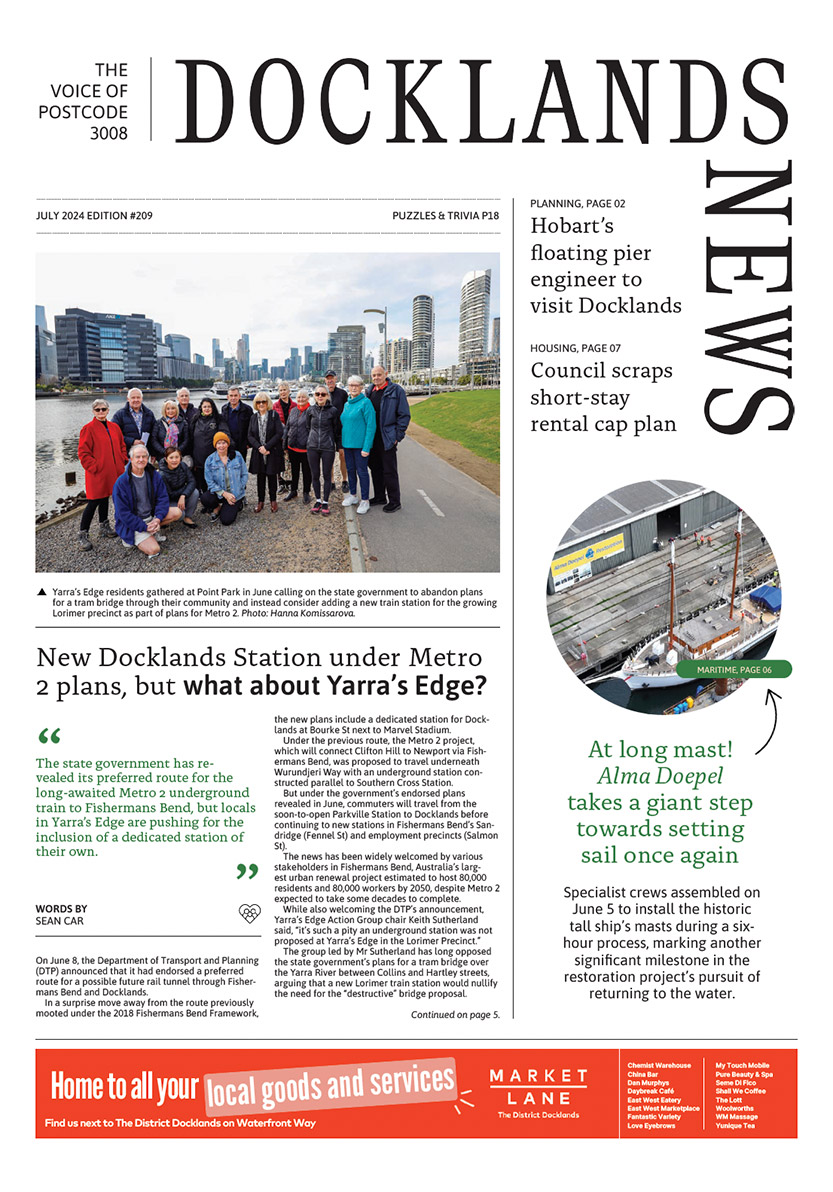Council’s “governance review” to tackle the Docklands Act
The City of Melbourne’s deputy chair of planning Cr Rohan Leppert has said “the timing is right” to embark on a governance review in an effort to move to a “post Docklands Act state”.
Cr Leppert made the comments at the November 8 Future Melbourne Committee meeting, whereby councillors unanimously endorsed the “Actions and Next Steps” report following September’s Docklands Summit.
While the report made a series of short- and medium-term recommendations to support reactivating the precinct, it was the longer-term recommendations of a strategic plan and governance review that Cr Leppert described as the “really, really big issues”.
The council says it will establish a “Docklands Governance Review Group”, which will include representation from “the various government agencies in Docklands” and review roles, responsibilities and decision making.
In his submission to the report, Docklands Representative Group (DRG) chairperson Ben Ball asked whether the council would review the Docklands Act 1991, which he said was created to “streamline planning decisions at the time [when] there were no residents”.
“Now that there are 17,000 residents in Docklands, it’s appropriate that residents can have input to planning applications that affect their high-density living,” Mr Ball said. “Other ‘carve outs’ in the Docklands Act regularly leaves council [with] the inability to make meaningful changes that residents ask for at these FMC meetings.”
Mr Ball added that, “similarly, the Docklands Community and Places Plan was created in 2012 and laid out numerous infrastructure project ideas, most of which haven’t eventuated” and asked councillors whether the plan would also be included in the review.
The Docklands Act – the overarching laws governing the precinct’s urban renewal – was created in 1991 to provide the then Docklands Authority (now Development Victoria) to enter into confidential agreements with developers to support streamlined development.
Development Victoria’s ongoing presence in Docklands has long been linked by many in the community with the “decision-making paralysis” that has long marred the precinct, which is governed by multiple authorities.
With an overwhelming majority of Docklands now built out, the DRG has called for residents to be given a say in planning matters affecting the area through the clear and publicly available controls set out in the Melbourne Planning Scheme.
In response to calls from the DRG, Cr Rohan Leppert said while there were still “a few key blocks which are yet to be developed”, bringing a review of the Docklands Act forward was “right” given the timing of the pandemic.
“What happens after this wave of development has concluded?” Cr Leppert asked.
“Well, most of the objectives and visions of those decisions to separate the Docklands Act and the strategic documents that fell out of that process early on have mostly been implemented.”
“So, what the position of government is, and by that I don’t mean the council and I don’t mean Development Victoria, but the government as a whole about what the future of Docklands is now that that mission is nearing conclusion.”
“This is a really, really important question … bringing that question a bit earlier than when we might have tried to tackle it and answer it given the timing of the pandemic, I think is the right one.”
Cr Leppert said the council needed to think carefully about when to “pull the starter’s trigger” on a governance review and the development of a strategic plan, because they “really have to happen at the same time”.
“If we want to move to a post Docklands Act state, which I would quite like to do because I’ve been here for 10 years and I’ve still never seen a single word written in any development agreement signed between any of the developers and Development Victoria or its precursors …” he said.
“Therefore, we don’t know what’s in store not just for building finance and development yield, but how many people are proposed for each precinct based on the agreements that are being set in secret. It makes it very difficult for government to plan for community when you don’t have access to that key information; even a summary of those development agreements.”
In flagging “a post Docklands Act way of planning” where “I hope the City of Melbourne takes the lead”, Cr Leppert called on the council to “give it our all, and let’s figure out what might be possible”.
The council has vowed to continue working with Docklands’ major planning authority Development Victoria as part of its partnership agreement. DV’s then group head of precincts Geoff Ward told Docklands News as recently as May that it still saw an important role for itself in Docklands.
“We’re delivering the urban renewal of Docklands by facilitating infrastructure, stimulating development, navigating planning and working with key stakeholders,” Mr Ward said.
“We know there is still more to do in Docklands – which is why we’re continuing to look at opportunities and events which will entice people to the area and support local businesses.”
“We continue to collaborate with the City of Melbourne to create one of Australia’s premier waterfront destinations – and ensure Docklands is rejuvenated in a manner that reflects its heritage well into the future.”
For more coverage on the Docklands Summit report, head to page 9 for a further report, as well as an editorial from Docklands resident Cr Jamal Hakim. •

New Docklands Station under Metro 2 plans, but what about Yarra’s Edge?





 Download the Latest Edition
Download the Latest Edition